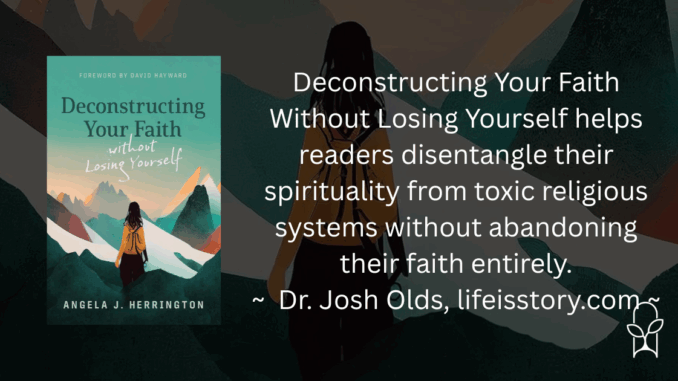
Also by this author: Flip It Like This!
Goodreads
How to heal religious trauma by releasing harmful beliefs Have you experienced #ChurchHurt? Are you frustrated by judgmental church people supporting oppressive systems? Do you have doubts about the faith tradition you were raised in but are afraid of losing your community? Angela J. Herrington has been there. And with over a decade of experience as a life coach, she can teach you how to begin healing religious trauma through deconstruction. Lively and empathetic, Angela will gently guide you through deconstructing your faith. This concise and actionable handbook will • give you permission to trust yourself, • show you how to seek new perspectives and information, • teach you how to embrace vulnerable exploration and self-compassion, and • help you release unhealthy beliefs that are harming you and marginalized persons. Deconstructing your long-held beliefs can be isolating and overwhelming. But you don’t have to do it alone. Begin your healing journey with Deconstructing Your Faith without Losing Yourself .
Deconstruction is one the biggest buzzwords in Christianity right now. I’m still not sure if I like it or not, but it typically refers to the process that believers in Christianity go through when they are no longer sure that what they believe in is good or true. That doesn’t necessarily mean that they no longer believe in Jesus or even the church, but that there are parts of their theology that they’ve come to see as toxic or harmful. And it can be hard to step away from those harmful spots. There’s no way to remain unscathed. Deconstructing harmful theology and practices inevitably means searching within your self and changing who you are. Deconstruction can be a painful and bewildering experience and, what I’ve found, is that many “deconstructed Christians” don’t know what their identity is in its wake. In Deconstructing Your Faith Without Losing Yourself, Angela J. Herrington offers a compassionate and practical guide on deconstructing without demolishing, saving your self even as you tear down the toxicity.
Drawing from her experience as a life coach and her own spiritual evolution, Herrington provides readers with tools to examine and release harmful beliefs, while fostering self-compassion and personal growth. Deconstructing Your Faith Without Losing Yourself helps readers disentangle their spirituality from toxic religious systems without abandoning their faith entirely.
Herrington’s strength lies in her empathetic approach and advice. She introduces the concept of “embodied curiosity,” encouraging readers to trust their intuition and embrace vulnerability as they question long-held doctrines. By categorizing beliefs into four “buckets”—to revisit, keep, release, or remain uncertain—she provides a structured yet flexible framework for personal exploration. Her inclusive language and acknowledgment of diverse experiences make the book accessible to a broad audience, including those from marginalized communities.
In an era where discussions around religious trauma and spiritual abuse are gaining prominence, Herrington’s work is particularly timely. She addresses the isolation and confusion that often accompany deconstruction, offering solace and solidarity to readers who may feel alone in their journey. By sharing stories from her own life and those of her clients, she normalizes the process of questioning and re-evaluating one’s faith, challenging the stigma often associated with such introspection.
Deconstructing Your Faith Without Losing Yourself is more than a self-help book; it’s a companion for those seeking to reconcile their spirituality with their evolving understanding of the world. Herrington doesn’t prescribe a one-size-fits-all solution but instead empowers readers to forge their own paths with courage and compassion. For anyone grappling with doubts or seeking a more authentic expression of faith, this book offers guidance, encouragement, and the reassuring reminder that they are not alone.
